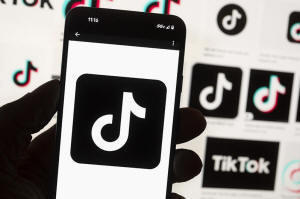China hit brakes on TikTok deal after Trump announced wide-ranging
tariffs, AP source says
[April 05, 2025] By
FATIMA HUSSEIN, AAMER MADHANI and SARAH PARVINI
WASHINGTON (AP) — President Donald Trump on Friday said he is signing an
executive order to keep TikTok running in the U.S. for another 75 days
to give his administration more time to broker a deal to bring the
social media platform under American ownership.
The order was announced as White House officials believed they were
nearing a deal for the app’s operations to be spun off into a new
company based in the U.S. and owned and operated by a majority of
American investors, with China's ByteDance maintaining a minority
position, according to a person familiar with the matter.
But Beijing hit the brakes on a deal Thursday after Trump announced
wide-ranging tariffs around the globe, including against China.
ByteDance representatives called the White House to indicate that China
would no longer approve the deal until there could be negotiations about
trade and tariffs, said the person, who spoke on the condition of
anonymity to discuss the sensitive details of the negotiations.
Congress had mandated that the platform be divested from China by Jan.
19 or barred in the U.S. on national security grounds, but Trump moved
unilaterally to extend the deadline to this weekend, as he sought to
negotiate an agreement to keep it running. Trump has recently
entertained an array of offers from U.S. businesses seeking to buy a
share of the popular social media site.
But on Friday it became uncertain whether a tentative deal could be
announced after the Chinese government’s reversal of its position
complicated TikTok’s ability to send clear signals about the nature of
the agreement that had been reached for fear of upsetting its
negotiations with Chinese regulators.
The near-deal was constructed over the course of months, with Vice
President JD Vance’s team negotiating directly with several potential
investors and officials from ByteDance. The plan called for a 120-day
closing period to finalize the paperwork and financing. The deal also
had the approval of existing investors, new investors, ByteDance and the
administration.
The Trump administration had confidence that China would approve the
proposed deal until the tariffs went into effect. Trump indicated Friday
that he can still get a deal done during the 75-day extension.

“My Administration has been working very hard on a Deal to SAVE TIKTOK,
and we have made tremendous progress,” Trump posted on his social media
platform. “The Deal requires more work to ensure all necessary approvals
are signed, which is why I am signing an Executive Order to keep TikTok
up and running for an additional 75 days.”
Trump added, “We look forward to working with TikTok and China to close
the Deal.”
A spokesperson for ByteDance confirmed in a statement that the company
has been discussing a “potential solution” with the U.S. government but
noted that an “agreement has not been executed.”
“There are key matters to be resolved,” the spokesperson said. “Any
agreement will be subject to approval under Chinese law.”

TikTok, which has headquarters in Singapore and Los Angeles, has said it
prioritizes user safety, and China’s Foreign Ministry has said China’s
government has never and will not ask companies to “collect or provide
data, information or intelligence” held in foreign countries.
Trump’s extension marks the second time that he has temporarily blocked
the 2024 law that banned the popular social video app after the deadline
passed for ByteDance to divest. That law was passed with bipartisan
support in Congress and upheld unanimously by the Supreme Court, which
said the ban was necessary for national security.
Rep. Raja Krishnamoorthi, the top Democrat on the House Select Committee
on China and a co-author of the TikTok bill, said Friday there should be
no further delay. “Bidders are lined up, and the clock is ticking. No
more excuses. It’s time to do the work. It’s time to comply with the law
and save TikTok now,” he said.
[to top of second column] |

The TikTok logo is seen on a mobile phone in front of a computer
screen which displays the TikTok home screen, Oct. 14, 2022, in
Boston. (AP Photo/Michael Dwyer, File)
 Although the decision to keep TikTok
alive through an executive order has received some scrutiny, it has
not faced a legal challenge in court. That type of pushback is
unlikely, legal experts say, due in part to how difficult it is for
someone to establish the legal right, or standing, to sue. A
plaintiff would have to be able to show harm from the delay in
enforcing the law.
Sarah Kreps, director of Cornell University’s Tech Policy Institute,
said she doesn't believe anyone has that standing.
“It would be different if this platform weren’t already in place,”
she said. “But if you’re trying to just continue with the status
quo, it’s different."
Still, if the extension keeps control of TikTok’s algorithm under
ByteDance’s authority, the national security concerns that led to
the ban persist.
Chris Pierson, CEO of the cybersecurity and privacy protection
platform BlackCloak, said that if the algorithm is still controlled
by ByteDance, then it is still “controlled by a company that is in a
foreign, adversarial nation-state that actually could use that data
for other means.”
“The main reason for all this is the control of data and the control
of the algorithm,” said Pierson, who served on the Department of
Homeland Security’s Privacy Committee and Cybersecurity Subcommittee
for more than a decade. “If neither of those two things change, then
it has not changed the underlying purpose, and it has not changed
the underlying risks that are presented.”
The law allows for one 90-day reprieve, but only if there’s a deal
on the table and a formal notification to Congress. Trump’s actions
so far violate the law, said Alan Rozenshtein, an associate law
professor at the University of Minnesota.
Rozenshtein pushed back on Trump’s claim that delaying the ban is an
“extension.”
“He’s not extending anything. This continues to simply be a
unilateral non enforcement declaration,” he said. “All he’s doing is
saying that he will not enforce the law for 75 more days. The law is
still in effect. The companies are still violating it by providing
services to Tiktok.
The extension comes at a time when Americans are even more closely
divided on what to do about TikTok than they were two years ago.
A recent Pew Research Center survey found that about one-third of
Americans said they supported a TikTok ban, down from 50% in March
2023. Roughly one-third said they would oppose a ban, and a similar
percentage said they weren’t sure.
Among those who said they supported banning the social media
platform, about 8 in 10 cited concerns over users’ data security
being at risk as a major factor in their decision, according to the
report.
Terrell Wade, a content creator with 1.5 million followers on TikTok
under the handle @TheWadeEmpire, has been trying to grow his
presence on other platforms since January.
“I’m glad there’s an extension, but to be honest, going through this
process again feels a bit exhausting,” he said. “Every time a new
deadline pops up, it starts to feel less like a real threat and more
like background noise. That doesn’t mean I’m ignoring it, but it’s
hard to keep reacting with the same urgency each time.”
He is keeping up his profile on Instagram, YouTube and Facebook in
addition to TikTok.
“I just hope we get more clarity soon so creators like me and
consumers can focus on other things rather than the ‘what ifs,’” he
said.
——
AP reporters Mae Anderson in New York and Didi Tang in Washington
contributed to this story.
All contents © copyright 2025 Associated Press. All rights reserved |